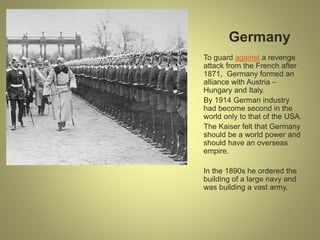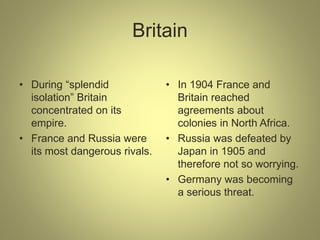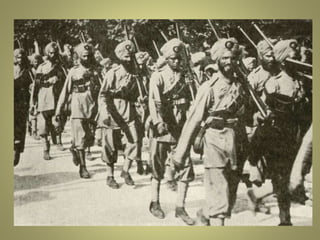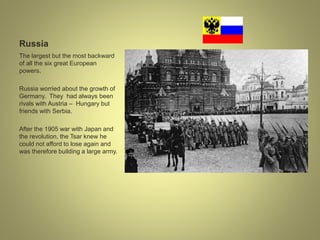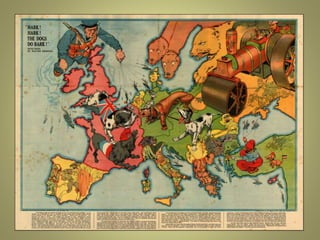Causes of World War 1
- 1. Causes of World War I In 1914 the six most powerful countries in Europe were divided into two opposing alliances. Each country was heavily armed and each one had reasons for distrusting other countries in Europe.
- 3. ALLIANCE • Firm military alliance • Oath to support and help allies when under attack ENTENTE • A more friendly pact
- 5. The Balance of Power Triple Alliance • Soldiers: 3 760 000 • Warships: 145 • Submarines: 41 Triple Entente • Soldiers: 3 161 000 • Warships: 194 • Submarines: 166
- 7. Central Powers or Triple Alliance 1882
- 8. Germany To guard against a revenge attack from the French after 1871, Germany formed an alliance with Austria – Hungary and Italy. By 1914 German industry had become second in the world only to that of the USA. The Kaiser felt that Germany should be a world power and should have an overseas empire. In the 1890s he ordered the building of a large navy and was building a vast army.
- 9. Austria Hungary How to keep this fragmented empire together? Concerns • Serbia was becoming a powerful force in the Balkans. • Russia supported the Serbs and had a very strong army.
- 10. Italy Though not a strong industrial or military power, Italy was looking to set up colonies and build up an overseas empire. Germany and Austria – Hungary did not entirely trust their ally. Their chief concern in signing this wasn’t the support of Italian armies, but to stop Italy attacking them over border issues! Italy promised to go to war if either was attacked by France. But crucially for Italy, there was a further clause, cancelling the deal if the Triple Alliance members were the aggressor. Shortly after, Italy signed a deal with France, pledging support if Germany attacked them.
- 12. Britain • During “splendid isolation” Britain concentrated on its empire. • France and Russia were its most dangerous rivals. • In 1904 France and Britain reached agreements about colonies in North Africa. • Russia was defeated by Japan in 1905 and therefore not so worrying. • Germany was becoming a serious threat.
- 14. France • The main concerns of France were to protect itself against attack by Germany. • To get back the industrial regions of Alsace and Lorraine.
- 15. Russia The largest but the most backward of all the six great European powers. Russia worried about the growth of Germany. They had always been rivals with Austria – Hungary but friends with Serbia. After the 1905 war with Japan and the revolution, the Tsar knew he could not afford to lose again and was therefore building a large army.
- 17. TENSION BUILDS • Anglo – German naval rivalry • Arms race on land • Plans for war
- 18. MORE TENSION Morocco - 1905 Morocco - 1911
- 19. The Spark that lit the bonfire 1908: Austria took over Bosnia and Herzegovina. Russia and Serbia protested but had to back down when Germany indicated it supported Austria. 1912 – 1913: Local wars. Serbia gained power in the area, 1914: Archduke Franz Ferdinand was murdered.








